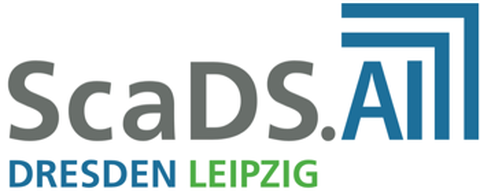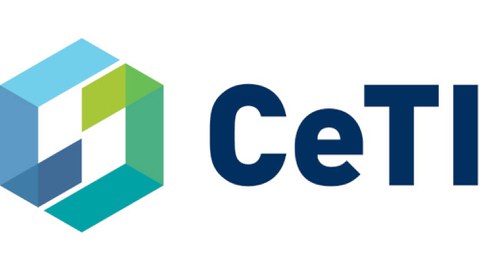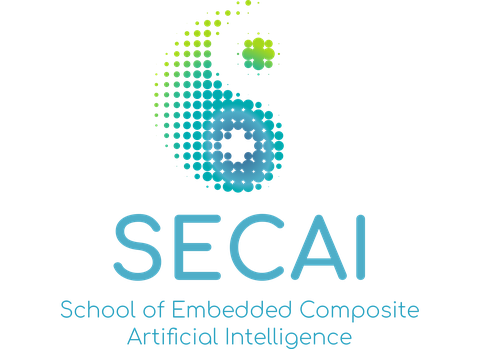Research on AI at TU Dresden
Table of contents
As part of the Excellence Initiative, the topic of digitalization and thus also the field of artificial intelligence became an integral part of TU Dresden's profile . The institutions and research projects collaborate in interdisciplinarily networks.
Research institutions and projects in the field of AI (selection)
ScaDS.AI
Scads.AI (Scalable Data Analytics and Artificial Intelligence) Dresden/Leipzig conducts research into artificial intelligence, data science and big data. It is one of the five new AI competence centers in Germany that are being funded as part of the German government's AI strategy. ScaDS.AI is one of the departments in the Center for Interdisciplinary Sciences (CIDS). To the ScaDS.AI website
CeTI
The Cluster of Excellence CeTI (Centre for Tactile Internet with Human-in-the-Loop) develops and applies AI methods in the context of human-machine interaction. The researchers aim to achieve significant breakthroughs in improving cooperation between humans and cyber-physical systems in real and virtual environments. An educational program developed by CeTI provides various digital modules aimed at school classes on topics in the context of AI. To the CeTI website
Institute of Artificial Intelligence
The Institute of Artificial Intelligence comprises Chairs and research groups of the Faculty of Computer Science that focus on research in sub-areas of artificial intelligence. Core research areas include data science, explainable AI and machine learning for computer vision. To the Institute's website
SECAI
The SECAI (School of Embedded Composite Artificial Intelligence) is a project of TU Dresden and Leipzig University to promote artificial intelligence in research and education. SECAI awards scholarships, strengthens teaching, finances researchers and promotes international exchange. To the SECAI website
Information Services and High-Performance Computing (ZIH)
As part of the National High-Performance Computing (NHR), the high-performance computers of the ZIH are available to scientists at German universities free of charge if their proposal is approved. Together with ScaDS.AI, ZIH offers further education and training courses on high-performance computing (HPC) to train users and applicants. ZIH is one of the departments in the Center for Interdisciplinary Sciences (CIDS). To the ZIH website
Schaufler Lab
The Schaufler Lab@TU Dresden is a project of TU Dresden and THE SCHAUFLER FOUNDATION that brings together scientists and artists and looks at the topics of artificial intelligence and digitization from a humanities, social science and artistic perspective. To the website of the Schaufler Lab
Current list of researchers related to AI at TU Dresden
Interdisciplinary research on the topic of AI or using AI is not only conducted in the above-mentioned competence centers, but also in the departments and Central Academic Units. This list represents only a small selection of all experts and is constantly being expanded. Please contact the CDIO office for change requests.
| Researcher | Core research areas or function |
|---|---|
| Bjoern Andres | Machine learning for computer vision |
| Franz Baader | Automata Theory |
| Anita Behme |
Applied Stochastics |
| Lars Bernard | Geoinformatics, research on modeling the semantics of environmental information, AI in earth system sciences for data integration and analysis |
| Dirk Brockmann | Complex systems, computational neuroscience and anomalous diffusion in biological and physical systems up to the dynamics of infectious diseases, human mobility, network theory and citizen science |
| Roberto Calandra | Explainable Artificial Intelligence |
| Jeronimo Castrillón | Compiler construction |
| Raimund Dachselt | Interactive data visualization with innovative control concepts, interactive interfaces, multimodal human-computer interaction, physical computing and mixed reality interaction |
| Anna-Maria De Cesare Greenwald | Romance linguistics, AI-generated texts (LLMs), Linguistic Studies on AI-Generated Texts |
| Michael Färber | Chair for Scalable Software Architectures for Data Analytics at ScaDS.AI |
| Matthias Forkel | AI for environmental modeling, e.g. for the carbon cycle, vegetation fires and drought effects |
| Diana Göhringer | Adaptive dynamic systems |
| Maik Gude | Lightweight design and structural assessment |
| Stefan Gumholdt | Computer Science, Computer Graphics and Visualization |
| Jakob Nikolas Kather | Digital health / AI for decision-making in medicine |
| Martin Keller-Ressel | Stochastic analysis and financial mathematics |
| Pascal Kerschke | Big data analytics in transportation |
| Marianne Kneuer | Digital democracy, e-government, e-participation |
| Thomas Köhler | Educational technology |
| Michael Kobel |
Particle Physics, AI methods in experimental data analysis |
| Markus Krötzsch | Theoretical computer science - intelligent knowledge management systems |
| Alexander Lasch | Digital Humanities / Linguistics and AI |
| Anne Lauber-Rönsberg | AI and law (e.g. property law), international studies on intellectual property law |
| Jens Lehmann | Intelligent Information Systems |
| Wolfgang Lehner | Database research, technology and applications (strong links to international industry partners, e.g. Microsoft Research and SAP) |
| Christian Mayr | Highly parallel VLSI systems and neuromorphic circuits |
| Wolfgang Nagel | Director of Scads.AI and CIDS - both at the interface of infrastructure, science and application of AI |
| Ostap Okhrin | Econometrics and Statistics, Data-driven and applied multivariate statistics |
| Birte Platow | Ethical aspects of AI |
| Anna Poetsch | AI in Genomics |
| Simon Razniewski | Language models, knowledge bases, natural language processing, common-sense knowledge |
| Sabine Roller | Software engineering for product virtualization |
| Sebastian Rudolph | Chair of Computational Logic at the Institute of Artificial Intelligence |
| Jakob Runge | Chair of Data Science at ScaDS.AI |
| Ivo Sbalzarini | Scientific computing for systems biology |
| Schaufler Lab | Artistic research on artificial intelligence |
| Michael Schroeder | Bioinformatics / ML in cancer research |
| Christian Schwarke | AI topics in the lectures "Anthropology", "Social Ethics" and in the seminar "Ethics - Human - Machine" |
| Martin Sedlmayr | AI as part of teaching in the fields of human medicine, public health and computer science |
| Frank Siegert |
Particle Physics, AI methods in theoretical simulation, experimental data analysis, and teaching |
| Arno Straessner |
Particle Physics, AI methods in detector read-out, experimental data analysis, and teaching |
| Gerhard Weber | Human-computer interaction |
| Martin Weigert | Chair of Machine Learning for Spatial Understanding at ScaDS.AI |





